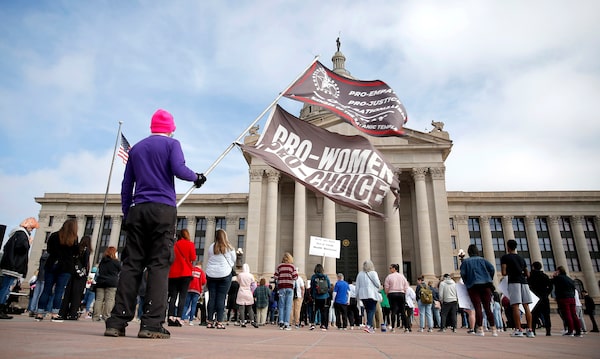
A person holds flags during the Bans Off Oklahoma Rally on the steps on Oklahoma state Capitol in Oklahoma City on April, 5, 2022.SARAH PHIPPS/The Associated Press
Planned Parenthood has stopped booking abortion procedures in Oklahoma after the state’s legislature passed a ban on most abortions, modelled after Texas legislation that empowered citizens to sue those who provide abortions.
The so-called “heartbeat” legislation, which bans abortions after the emergence of a fetal heartbeat – at about six weeks of pregnancy – will go into immediate effect once it is signed by Governor Kevin Stitt, who has pledged to approve all such measures. The Oklahoma Senate on Thursday also approved a bill that would more fully ban abortions, using a Texas-style provision that deputizes citizens to enforce the law through civil courts.
The laws, which reproductive-rights groups pledged to fight, offer some medical exemptions. But their aim is to largely end legal abortions in Oklahoma, while also closing it off as an alternative for women from Texas seeking a place for such procedures. The Texas heartbeat prohibition has been in effect since last September.
“The Texas law has already saved the lives of many unborn children,” Julie Daniels, a Republican senator, said in a statement. “We can achieve the same result in Oklahoma.”
The changes in these two states alone threaten to disrupt abortion access across the U.S., “because there are simply not enough clinics to meet capacity,” said Elizabeth Nash, who tracks state reproductive-health policy at the Guttmacher Institute in Washington.
At Little Rock Family Planning Services, abortion waiting lists had already stretched to more than four weeks before the Oklahoma decisions, which now stand to divert more women to Arkansas. The waits may now “be even longer because people are calling every minute,” said Natalie Tvedten, who owns the clinic with her husband. “We’re going to be inundated.”
But Arkansas has itself sought to ban abortion, and the Oklahoma laws presage a year that could bring dramatic change to U.S. abortion rights, already eroded after more than a decade of Republican control of key southern states. The U.S. Supreme Court is expected to rule in coming months on the constitutionality of a Mississippi law that bans most abortions after 15 weeks of pregnancy.
With conservative justices now in a solid majority, the Supreme Court decision in that case is expected to overturn or considerably diminish the rights secured by the Roe v. Wade case in 1973, which legalized abortion up to the point of fetal viability, or around 24 weeks.
“Everyone is expecting that abortion rights will be substantially damaged if not overturned in the Mississippi case, and that will unleash a wave of abortion bans across the country,” said Ms. Nash.
This year, she said, “I feel like it’s the year we lose Roe.”
The Supreme Court has already on three occasions declined to review the Texas heartbeat law, allowing it to remain in place and raising its profile as a successful template for others to follow.
Thirteen states have already introduced legislation styled after the Texas law. Across the U.S., legislators have introduced 536 abortion restrictions this year and enacted 35. A further 86 abortion bans have been introduced, and six enacted, according to the Guttmacher Institute.
Ms. Tvedten has begun considering a move to Illinois, the nearest state that has upheld abortion rights. As southern states move together against abortion, states such as Illinois are “not going to be able to handle the flood that’s coming,” she said.
Oklahoma has been among the U.S. leaders in conservative legislation, with Mr. Stitt signing a bill this week that prohibits nonbindary gender designations on birth certificates. The state’s House of Representatives on Thursday also passed a bill to open public-school bathrooms only to those of a particular biological sex, rather than based on gender identity.
With Republicans in full command of Oklahoma’s government, state politics have increasingly been determined by battles inside the party. “Most folks are looking for how to win a Republican primary, and the abortion issue is a very important one there,” said Pat McFerron, a political consultant and pollster in Oklahoma City. In more than 70 per cent of cases, he said, Republican voters choose a more conservative candidate.
Abortion providers nevertheless promised to fight the Oklahoma legislation in state courts. “The Oklahoma Supreme Court has repeatedly found that the state legislature’s extreme attempts to restrict abortion are unconstitutional, and these bans are some of the most extreme yet,” Nancy Northup, president of the Center for Reproductive Rights, said in a statement.
But Planned Parenthood, in response to questions from The Globe and Mail, said it “is not scheduling any abortion procedures in Oklahoma, for now,” citing that the possibility of the state’s governor signing the heartbeat legislation into law “at any time.”
Oklahoma Democrats criticized the new legislation, saying the ban passed by the Senate Thursday raised the prospect of women who miscarry being forced to legally defend their innocence, or doctors refusing to see pregnant women for fear of being accused of counselling abortion.
“It seriously jeopardizes women’s health,” said Senator Mary Boren.
Opposition to that bill came also from the right, with some saying it does not go far enough against what Senator Warren Hamilton called “murder.” He called for Oklahoma “to eliminate that heinous crime in its entirety,” saying that time is coming.
“I believe that next year we will also see reams of legislation that promise to end abortion,” he said.
 Nathan VanderKlippe
Nathan VanderKlippe